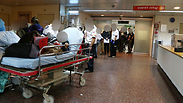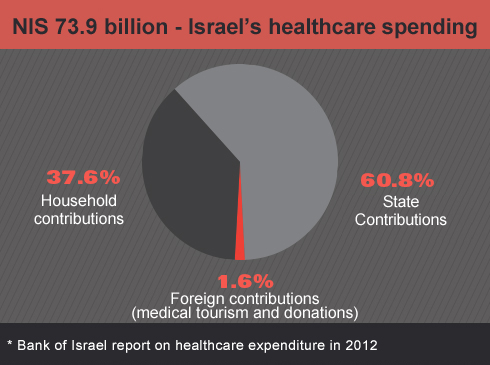
Overcrowded hospital
צילום: עופר עמרם
Bank of Israel report reveals Israeli public pays NIS 7.4B for health care
New report reveals upsetting data about Israeli healthcare, revaling Israelis paying for more than third of healthcare costs, while private healthcare bleed out HMO funds.
As the public health system in Israel continues to crumble, Israelis pay NIS 7.4 billion a year on private or supplemental health insurance, a report released by the Bank of Israel on Tuesday found, noting these expenses are on the rise.
The national health expenditure in 2012 was NIS 73.9 billion, a sum equal to 7.5 percent of Israeli GNP. The health system in Israel still based mainly on public funding and on public health services, but the share of private insurance is only increasing, but not necessarily to either the public or the system's benefit.
About a third of the national health expenditure is invested in businesses that provide private health services seeking to make a profit. This business sector of health services includes independent doctors, private pharmacies, private dentists and medical examination institutes. This sector includes institutes operating with a license from the Health Ministry such as private hospitals, surgical clinics and dialysis institutes.
Before tax deductions, these private health providers made NIS 123 million in 2012 - only 0.2 percent of the total national health expenditure. Almost 7 percent of these private providers' business came from medical tourists.
Israeli citizens pay NIS 3.25 billion a year in deductible fees to the different HMOs for services that are included in the healthcare basket. An additional NIS 1.2 billion comes from citizens who pay for long-term hospitalization.
The Bank of Israel report states that a share of private funding, which includes funds citizens pay directly out of their own pockets for services as well as income from medical tourists, is high compared to other countries, and has increased over the years. In 1995, private funding was 31.7 percent of the total national health expenditure, while in 2013 it leapt to 39.7 percent.
The report also noted that while private healthcare pays patients back for up to 60 percent of their expenses, three of Israelis major HMOs (Maccabi, Leumit and Mehuhedet) had a combined deficit of NIS 421 million, with only Clalit having a profitable year. The reason is the private health care, which functions in addition to regular HMOs, pay Israelis back 83 percent of their premium costs, effectively draining funds from the HMOs.
The Bank of Israel noted that in 2010, the per capita investment in health was $71, less the half of the OECD overage ($139). Israel also lags behind in average hospitalization length – with 4.3 days per capita as opposed to the OECD average of 6.3.











